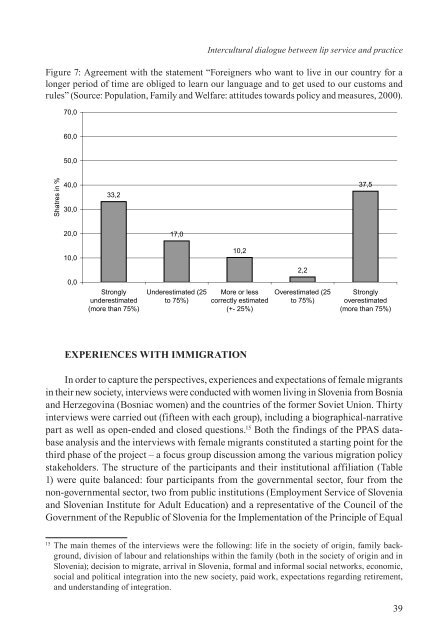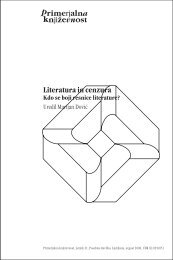30 • 2009 - Dve domovini / Two Homelands - ZRC SAZU
30 • 2009 - Dve domovini / Two Homelands - ZRC SAZU
30 • 2009 - Dve domovini / Two Homelands - ZRC SAZU
You also want an ePaper? Increase the reach of your titles
YUMPU automatically turns print PDFs into web optimized ePapers that Google loves.
Figure 7: Agreement with the statement “Foreigners who want to live in our country for a<br />
longer period of time are obliged to learn our language and to get used to our customs and<br />
rules” (Source: Population, Family and Welfare: attitudes towards policy and measures, 2000).<br />
70,0<br />
Intercultural dialogue between lip service and practice<br />
60,0<br />
50,0<br />
Shatres in %<br />
40,0<br />
<strong>30</strong>,0<br />
33,2<br />
37,5<br />
20,0<br />
17,0<br />
10,0<br />
10,2<br />
2,2<br />
0,0<br />
Strongly<br />
underestimated<br />
(more than 75%)<br />
Underestimated (25<br />
to 75%)<br />
More or less<br />
correctly estimated<br />
(+- 25%)<br />
Overestimated (25<br />
to 75%)<br />
Strongly<br />
overestimated<br />
(more than 75%)<br />
EXPERIENCES WITH IMMIGRATION<br />
In order to capture the perspectives, experiences and expectations of female migrants<br />
in their new society, interviews were conducted with women living in Slovenia from Bosnia<br />
and Herzegovina (Bosniac women) and the countries of the former Soviet Union. Thirty<br />
interviews were carried out (fifteen with each group), including a biographical-narrative<br />
part as well as open-ended and closed questions. 15 Both the findings of the PPAS database<br />
analysis and the interviews with female migrants constituted a starting point for the<br />
third phase of the project – a focus group discussion among the various migration policy<br />
stakeholders. The structure of the participants and their institutional affiliation (Table<br />
1) were quite balanced: four participants from the governmental sector, four from the<br />
non-governmental sector, two from public institutions (Employment Service of Slovenia<br />
and Slovenian Institute for Adult Education) and a representative of the Council of the<br />
Government of the Republic of Slovenia for the Implementation of the Principle of Equal<br />
15<br />
The main themes of the interviews were the following: life in the society of origin, family background,<br />
division of labour and relationships within the family (both in the society of origin and in<br />
Slovenia); decision to migrate, arrival in Slovenia, formal and informal social networks, economic,<br />
social and political integration into the new society, paid work, expectations regarding retirement,<br />
and understanding of integration.<br />
39

















